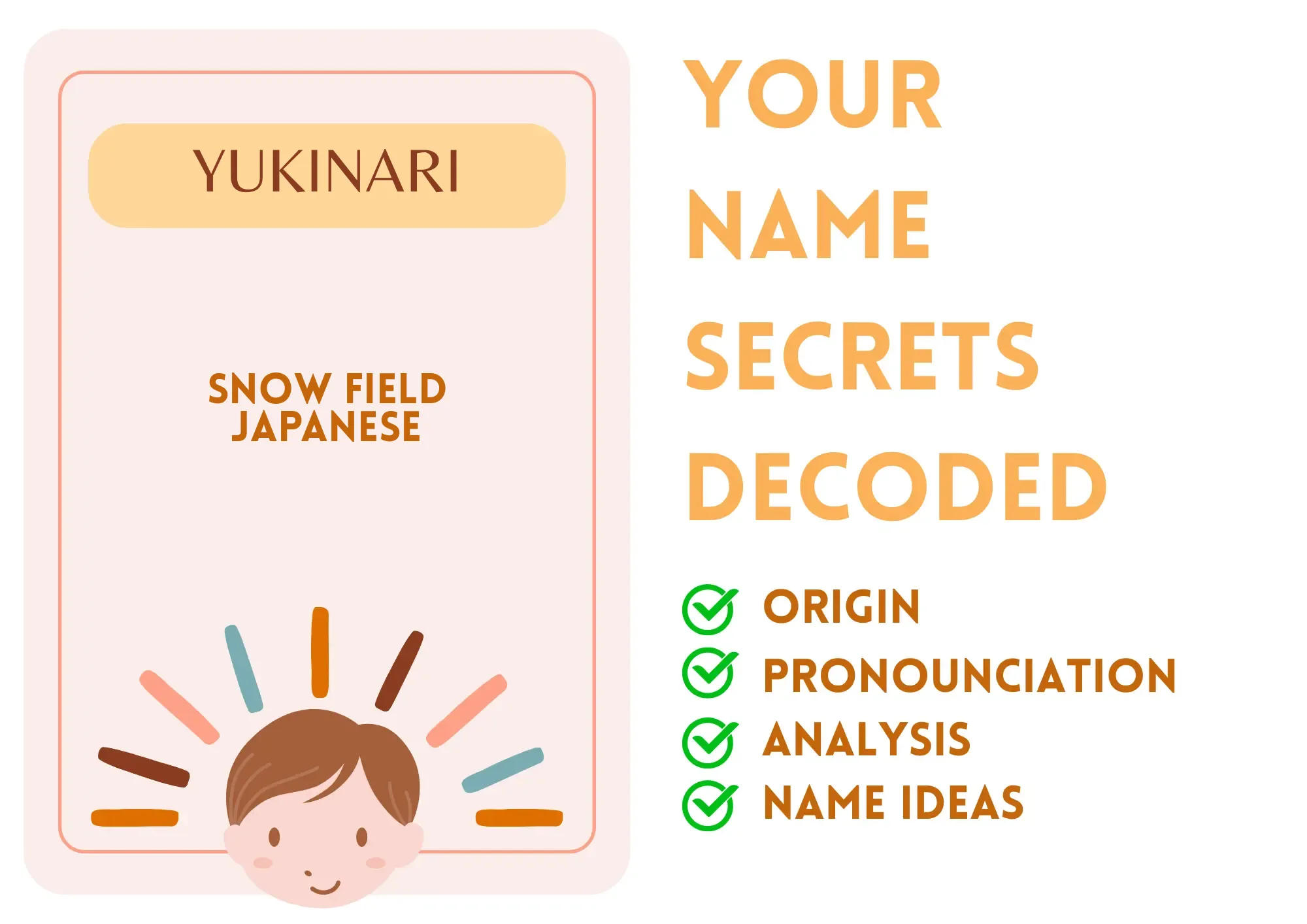
Yukinari
Yukinari is a unique name of Japanese origin that signifies 'snow' (yuki) and 'field' or 'area' (nari). It often evokes imagery of serene winter landscapes and the beauty of nature, making it a poetic choice for parents drawn to the tranquility of winter aesthetics.
Yukinari is typically perceived as a masculine name in Japan, yet it can also be embraced as unisex. It carries cultural significance, embodying aspects of harmony and natural beauty, which are celebrated in Japanese traditions.
While not widely used in popular culture, Yukinari encapsulates the essence of Japanese art and literature, often symbolizing peace and calm. Parents who choose this name often have a fond appreciation for nature and seek to impart these values onto their child.
Basic Information
Gender: Boy
Sounds Like: Yoo-kee-nah-ree
Pronunciation Explanation: The name is pronounced with the emphasis on the second syllable 'kee', followed by a soft 'nah' and ending with 'ree'.
Summary and Meaning
Meaning: snow field (Japanese)
Origin: The name has Japanese origins, derived from elements of the language that describe natural phenomena.
Usage: Typically a masculine name in Japanese culture, although it may also be used for girls.
Name Number (Chaldean)
Name Number (Pythagorean)
Popularity (Global Rank)
Overall: 190173
Boys: 72681
Most Popular in
Religious and Cultural Significance
Religion: Shinto
Background: In Shinto, the indigenous spirituality of Japan, names like Yukinari reflect a deep respect for nature and the changing seasons.
Cultural Significance: Yukinari is valued for its connection to the beauty of winter. Names that reference nature are common in Japan and are often seen as poetic and reflective.
Historical Significance: While it may not have a specific historical figure associated with the name, Yukinari represents the broader Japanese tradition of naming, which often draws inspiration from nature and the environment.
Popular Culture
Literature and Mythology: Though not a household name, Yukinari might appear in niche literature or anime that explore themes of winter or nature.
Movies and Television: Characters named Yukinari may occasionally be found in anime or dramas, often reflecting their serene and touching traits.
Feelings and Perceptions
Perception: Yukinari is perceived as a gentle and serene name, generating feelings of calmness and connection to nature. It is appreciated for its uniqueness and beautiful phonetics.
Positive Feelings: Beautiful, unique, calm, connected to nature, serene, poetic.
Negative Feelings: May be considered unfamiliar or difficult to pronounce for non-Japanese speakers.
Practical Considerations
Ease of Writing and Calling: Yukinari is moderately straightforward to write, though the Japanese kanji may complicate matters. The name has six syllables, making it relatively easy to call out once learned.
Common Typos and Misspellings: Yukinari,Yukinari,Yukinary,Yuknari
Common Nicknames: Yuki,Nari,Yukky
Yukinari Popularity
Yukinari Usage and Popularity By Country
| Country | Rank (Overall) |
|---|---|
| Japan | 2840 |
| Pakistan | 37882 |
| Thailand | 60600 |
| United States | 186323 |
| India | 378646 |
Yukinari Usage and Popularity By City
| City | Rank (Overall) |
|---|---|
| Tokyo | 3782 |
| Shanghai | 11719 |
Compatibility Analysis
Famous Persons Named Yukinari
Related Names
Similar Sounding Names:
Yukito,Yumiko,Yuki,Yunari
Similar Meaning and Related Names:
Sibling Name Ideas (Brothers):
Kaito ♂️
Ren ♀️
Buddhist, Shinto (Japanese), Confucian (Korean)
Sibling Name Ideas (Sisters):
Nami ♂️
N/A